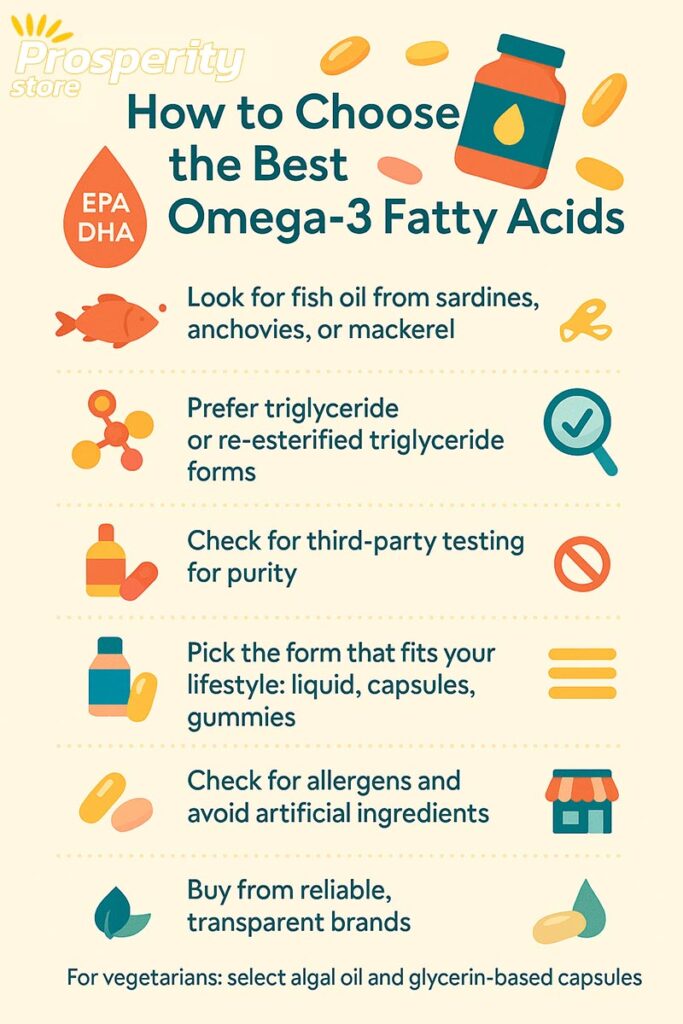The Benefits of Omega-3 Supplements
Summarize

Omega-3s are polyunsaturated fatty acids (PUFAs) obtained mainly through dietary supplements, with a small amount consumed in food.. As a type of fat, omega-3s are essential to cell metabolism and many bodily functions and systems, including the heart and brain. The primary reason people experience an omega-3 deficiency is that their diet lacks the essential nutrients, but that is easily corrected by taking EPA and DHA omega-3 supplements.
Types of Omega-3 Fatty Acids
Three primary omega-3 fatty acids have been most extensively studied.
- Docosahexaenoic acid (DHA)
- Eicosapentaenoic acid (EPA)
- Alpha-linolenic acid (ALA)
ALA is an essential fatty acid. As an essential fatty acid, the body breaks down ALA into small amounts of EPA and DHA, meaning ALA is a precursor for the other kinds of omega-3 fatty acids. However, only a small amount of ALA is converted, so taking EPA and DHA supplements is important for a healthy diet.
Sources of Omega-3 Fatty Acids
The primary sources of ALA are plant-based. DHA and EPA are found in high amounts in fatty fish.
1. Plant-based omega-3 sources
ALA omega-3 fatty oils are found in plant oils. Some of the common plant oils include olive oil, canola oil, and soybean oil. Nuts and seeds are also significant sources. They include black walnuts, flaxseed, pistachio nuts, pumpkin and squash seeds, and pine nuts.
2. Non-plant-based omega-3 sources
EPA and DHA are primarily sourced from fish and seafood. They include grouper, herring, oyster, red snapper, salmon, halibut, and tilapia.

3. Supplements
Omega-3s can also be obtained through dietary supplements. The most common supplements are fish oil, cod liver oil, and krill oil, which contain high amounts of EPA and DHA. For vegetarians, there is also algal oil that is made from algae.
Algal oil, flaxseed oil, soybean oil, and canola oil also contain some ALA, EPA, and DHA. However, the fish oils are the best EPA and DHA supplements because they contain the highest amounts of these omega-3 fatty acids.
Omega-3 Benefits
Numerous clinical studies have reported that omega-3 fatty acids may deliver several significant health benefits. They are essential to cell membranes and support the functioning of the lungs, immune system, heart, hormone system, brain, and eyes. Some of the specific benefits that are well documented include the following.
1. Heart health
Medical professionals agree that taking omega-3 fatty acids for heart health may help reduce the risk of cardiovascular disease by lowering triglyceride levels.
2. Brain functioning
Taking omega-3 for brain function may improve memory, learning, blood flow to the brain, and cognitive processing.
3. Eye health
There is clinical evidence that Omega-3 Fatty Acids may slow the progression of age-related macular degeneration and help relieve symptoms of dry eye disease. In both cases, more research is needed.
4. Increase cell energy
EPA and DHA are important for maintaining cell energy. When cells are compromised, the body’s response can lead to various health issues. They include vascular problems, high cholesterol, high blood pressure, and diabetes, among others. EPA and DHA also contribute to healthy mitochondrial function, which reduces the risk of developing systemic swelling.
Choosing the Best Supplements
Omega-3s are consumed through diet or supplements. Fish oil supplements are popular because the health benefits of fish oil in supplements are similar to those experienced when obtaining omega-3s through a balanced diet.
📜
Although it is always best to obtain nutrients through food, taking fish oil is a convenient option. One caution is not to take too much if you choose the liquid form, as it is easily consumed.
The following are some tips for choosing the best omega-3 supplements.
→ Choose EPA and DHA supplements that have high levels of the omega-3s.
→ The supplements with the highest amount of omega-3 fatty acids are made from sardines, anchovies, and/or mackerel.
→ Look for fish oil in triglyceride (natural form) or re-esterified triglyceride form because they are more bioavailable compared to ethyl esters.
→ Choose brands that have had their products third-party tested for toxic compounds, such as mercury and PCBs.
→ Buy a fish oil product that works best for a personal lifestyle because products include liquids, capsules, and gummies.
→ Check the product for allergens and artificial ingredients, such as colors and flavors.
→ Buy high-quality supplements that have no or minimal fillers.
→ Buy from reliable brands with a strong reputation for transparency and honesty in labeling.
→ If a vegetarian, choose algal oil and softgels or capsules made from glycerin.

When selecting different forms of omega-3 supplements, several factors should be considered. For example, liquid fish oils need refrigeration and may have a stronger taste. Capsules are a convenient option for those who prefer to avoid the taste of fish oil. Enteric-coated fish oil supplements are designed to dissolve in the small intestine, making them a good choice for anyone with stomach issues or who wants to avoid fishy burps. Gummies are a popular choice for those who have difficulty swallowing pills. Understanding these differences makes it easier to select the most suitable form of omega-3 supplement for personal needs.
Recommended Dosage Amount
The National Institutes of Health’s Office of Dietary Supplements recommends amounts in an omega-3 dosage guide. Men need 1.6 grams daily, and women need 1.1 grams daily.
The Food and Drug Administration recommends a maximum intake of three grams of EPA and DHA combined from all sources. The recommended daily intake of omega-3 supplements is 2 grams, with an additional 1 gram obtained from food.
Consult a Doctor
It is important to consult a doctor before taking omega-3 supplements. They benefit health in the right amounts, but the supplements may interact with some medications. There is also evidence that EPA and DHA supplements may increase the risk of bleeding in some people. Pregnant and nursing women can take omega-3 supplements, but there are different recommendations for the daily amounts.
It is easy to assume that supplements, being sold over the counter, are harmless. However, EPA and DHA are nutrients that play a significant role in the body, and it is crucial to get the dosage right.
Sources
- https://nutrition.ucdavis.edu/outreach/nutr-health-info-sheets/consumer-omega3
- https://pmc.ncbi.nlm.nih.gov/articles/PMC8413259/
- https://pmc.ncbi.nlm.nih.gov/articles/PMC9641984/#sec3
- https://www.macular.org/living-and-thriving-with-amd/nutrition/important-nutrients/antioxidant-vitamins-and-zinc-areds and https://pmc.ncbi.nlm.nih.gov/articles/PMC10672334/
- https://www.sciencedirect.com/science/article/pii/S2405457724001992#sec5
- https://pmc.ncbi.nlm.nih.gov/articles/PMC10084997/#sec1-4
- https://lpi.oregonstate.edu/mic/other-nutrients/essential-fatty-acids#toc-disease-prevention
- https://www.nccih.nih.gov/health/omega3-supplements-what-you-need-to-know
- https://www.mayoclinic.org/drugs-supplements-fish-oil/art-20364810
- https://pmc.ncbi.nlm.nih.gov/articles/PMC11123365/
- https://pmc.ncbi.nlm.nih.gov/articles/PMC11012042/
- https://ods.od.nih.gov/factsheets/Omega3FattyAcids-Consumer/
- https://www.ncbi.nlm.nih.gov/books/NBK564314/
Share this post
